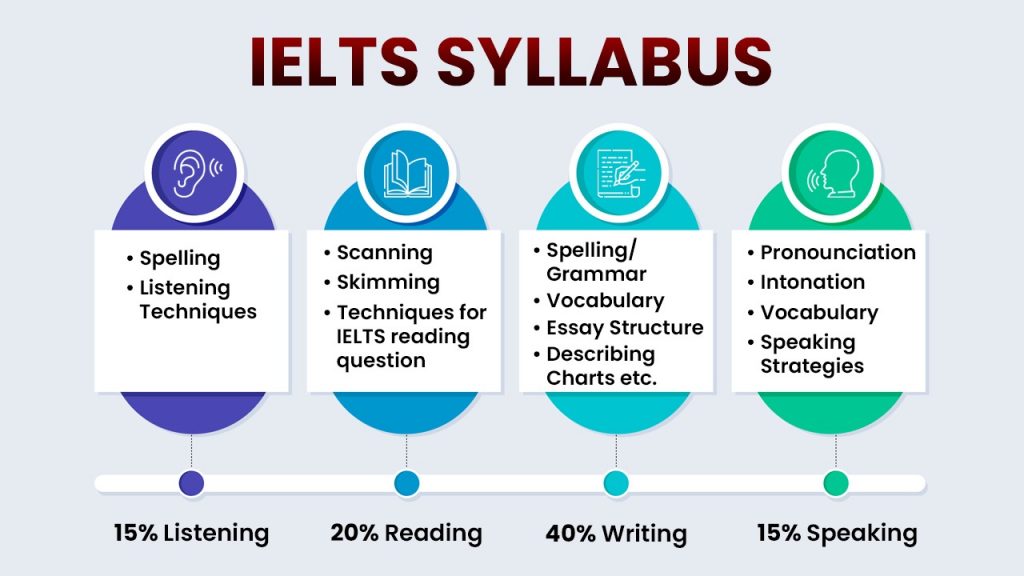This blog is a comprehensive overview of IELTS exam syllabus and scoring. The International English Language Testing System, or IELTS, is one of the most popular-standardized tests used by non-native English speakers and universities around the world.
Read to explore the various aspects of this test in depth, including an overview of what it entails and an explanation of its scores and their meaning.
In addition to that, we have shared the syllabus and requirements for taking IELTS. By examining these topics further, you can gain a better understanding of whether this test is right for you.
IELTS Exam Syllabus and Scoring 2023: An Overview
The International English Language Testing System (IELTS) is a standardized test that measures non-native speakers’ ability to communicate in the English language. It assesses four key areas: reading, writing, listening, and speaking. The exam consists of two parts: academic and general training, each with its own specific purpose, syllabus, and requirements.
In order to take the IELTS exam, applicants must meet certain criteria. When it comes to the actual testing process, there are different formats available depending on which version of the exam you choose; however, all versions follow a similar format consisting of multiple choice questions, short answer questions, and essay tasks. Furthermore, scores range from 0 to 9 for each section, with higher numbers indicating better performance overall in addition to being accepted by some universities for further study.
Overall, taking the IELTS test can be hard, but it can also be worth it if you spend enough time studying before the test. With practice materials readily available online combined with official guidance from accredited organizations like iQuanta, IELTS students aspiring towards academic success should have no problem tackling this test head-on!
IELTS Scores: What Do They Mean?
IELTS is a standardized test that measures how well people who don’t speak English as their first language can communicate in English. As mentioned before, it assesses four key areas: reading, writing, listening, and speaking. The IELTS Academic exam serves a specific purpose, has a specific syllabus, and has specific requirements. When it comes to score interpretation, results range from 0 to 9 for each section, with higher numbers indicating better performance.
The different scores are used as indicators of a person’s level of proficiency to decide if they are ready for college or another training program.
For instance, a score of 6 or higher on the academic version would show that you know enough English to get into most first-year college programs.
While a score of 7 or 8 may be required for graduate programs, depending on the institution’s individual criteria.
Additionally, those aspiring towards professional certifications should aim at achieving a band score of 9 since this indicates an exceptional command of the English language, which can open many doors when seeking employment opportunities abroad!
Understanding IELTS Scores Section-wise
The raw score obtained out of 40, both in listening and reading test, is used to calculate the IELTS band scores respectively.
IELTS Listening
| Questions | 40 |
| Each Correct Answer Awarded | 1 mark |
The raw scores are converted to the IELTS nine-band scale and reported in whole and half bands.
IELTS Reading
| Questions | 40 |
| Each Correct Answer Awarded | 1 mark |
The raw scores are converted to the IELTS nine-band scale and reported in whole and half bands.
IELTS Writing
A band score is awarded for each of the four criteria:
- Task Achievement (for Task 1), Task Response (for Task 2)
- Coherence and Cohesion
- Lexical Resource
- Grammatical range and accuracy
After equally evaluating all the criteria, the writing band score for the task is the average.
IELTS Speaking
A band score is awarded for the following four criteria:
- Fluency and Coherence
- Lexical Resource
- Pronunciation
- Grammatical range and accuracy
After putting all the criteria on an equal scale, the speaking band score for the task is the average.
Understanding IELTS Band Score
| Band Score | Skill Level | Description |
| 9 | Expert | You speak fluently. You comprehend and speak English well. |
| 8 | Very Good | Only rare unsystematic errors and improper use mar your language proficiency. Unfamiliar settings may cause confusion. You handle intricate reasoning effectively. |
| 7 | Good | You can use the language, but you make mistakes and sometimes misinterpret. You usually grasp sophisticated language and logic. |
| 6 | Competent | Despite errors, misusage, and misconceptions, you speak well. In familiar contexts, you comprehend and employ complicated words. |
| 5 | Modest | You understand much of the language, yet you make frequent blunders. Basic field communication is required. |
| 4 | Limited | You can only handle familiar circumstances. You often struggle with comprehension and expression. Complex language eludes you. |
| 3 | Extremely Limited | In familiar settings, you communicate and comprehend just generic meaning. Communication fails often. |
| 2 | Intermittent | You struggle with spoken and written English. |
| 1 | Non-User | You can’t speak the language except for a few words here and there. |
| 0 | Didn’t Attend the Test | You did not answer the question |
IELTS Score Validity
IELTS scores are valid up to two years. However, every college/university may set a validity period according to their study program requirements.
IELTS Exam Syllabus Section-wise: What’s Tested?
The IELTS test is divided into four sections: reading, writing, listening, and speaking. Each section has its own syllabus, which focuses on different aspects of the language in order to assess an individual’s proficiency level.
Specifically, the reading component examines a person’s ability to understand written text from various sources, such as books, magazines, and newspapers, whereas the writing aspect evaluates how well one can express themselves by organizing their thoughts in a coherent manner.
In the listening section, test-takers have to understand everything from conversations between two people to conversations between a group of people. In the speaking section, the candidate has to speak clearly and fluently with another person or in a group.
All together, these components provide an overall picture of someone’s command of the English language, allowing universities and other institutions to make informed decisions about admissions.
In terms of preparation for the IELTS exam itself, it is important that applicants become familiar with what each part entails, so they can practice accordingly prior to taking this rigorous assessment.
IELTS Exam Listening Syllabus
You will listen to four recordings.
Recordings 1 and 2: are about everyday social situations.
Recordings 3 and 4: are about educational and training situations.
Based on the recordings you hear, you will have to answer the following types of questions:
- Plan, map, diagram labelling
- Short answer questions
- Sentence completion
- Form, note, table, flow-chart summary completion
IELTS Exam Reading Syllabus
You will be given a factual, analytical, or descriptive passage taken from journals, newspapers, books, and magazines. Based on the passage, you will be asked to answer the following types of questions:
- Short answers
- Diagram label completion
- Identifying the writers views
- Multiple choice
- Identifying information
- Matching information/headings/features
- Matching sentence endings
- Sentence completion
- Summary completion
- Note, table, flow-chart completion
IELTS Exam Writing Syllabus
The writing test includes two tasks with generic topics.
Task 1: You will be given a chart, diagram, graph, or table with information and asked to summarize, describe, or explain it in your own words.
The different types of explanations asked are:
- Describe and explain data
- Explain how something works
- Describe the stages of a process, or
- Describing an event or an object
Task 2: You will be given an argument, point of view or a problem and asked to write an essay in 250 words
Tip: Responses to both tasks must be formal.
IELTS Exam Speaking Syllabus
- Your communication skills are tested on fluency, pronunciation, and grammatical accuracy. There is no fixed syllabus for the IELTS speaking test. But make sure to practice talking to your friends and family in English about everyday topics and common experiences.
IELTS Exam Requirements: What You Need to Know
The International English Language Testing System (IELTS) is a test for people who don’t speak English as their first language that is recognized all over the world. It has four main parts: reading, writing, listening, and speaking. Depending on the test taker’s goals, there are both academic and general training versions of the test. When it comes to IELTS requirements for registration, applicants should be aware that there are specific eligibility criteria that must first be met before taking this exam.
- Generally speaking, anyone aged 16 or over may register; however, additional restrictions may apply in certain countries where candidates must meet a minimum age requirement prior to being allowed to take this test.
- In regard to fees, these vary depending on location, so it is important that those interested check with their local centres beforehand for any applicable charges related to sitting this exam.
- Finally, when it comes time for registration itself, applicants should come prepared with valid identification documents such as passport or driving licence since they will be required during the sign-up process.
Overall, knowing what you need to do before the IELTS exam can help you pass it without any surprises.
For comprehensive guidance and to enroll for iQuanta’s newly launched GMAT Course, visit the link below.
For daily practice questions and 24*7 doubt clarification, join the group linked below




